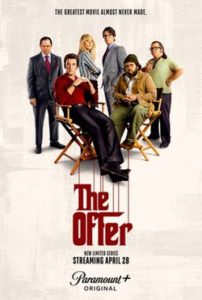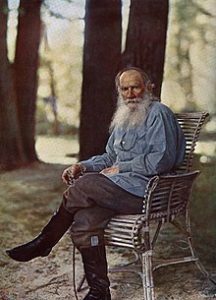I Can’t Take It Anymore!

Like just about everyone else on the planet, The Godfather is on my top-ten best-movies-of-all-time list. So, when PP recommended The Offer, a docudrama series about the making of Francis Ford Coppola’s masterpiece, I checked it out.
By the end of episode one, I was hooked. I binge-watched another four the following night, staying up till the wee hours. So far, so good. I’ve learned something new with every episode. The intellectual and emotional return on the 4.5 hours I’ve invested in this series has been positive. But I am getting anxious. The producers need to finish it up in another two or three episodes. If they drag it out, I’ll be disappointed. And they probably will. It’s scheduled for another five.
Welcome to the world of crack TV – where you can while away the rest of your life in the mire of episodic programming. It’s a grim world where denizens huddle, droopy-eyed, in front of the screen, hoping to feel once again the rush they got from that first bit of tense and brilliant storytelling, only to be lulled into a never-ending stream of brain-wrenching plot twists, mandatory cliff hangers, and inevitable shark jumping.
Example: The Man in the High Castle, a 2015 four-season, 40-episode drama depicting “what the world would be like if the Japanese and Germans had won WWII.”

The Man in the High Castle is based on a book of the same title by Philip K. Dick. A big fan of Blade Runner (based on Dick’s Do Androids Dream of Electric Sheep?), I gave the series a look.
The first episode was great. The next several almost as good. And then each one that followed was weaker than the one before.
And yet, against my better judgment, I watched 32 episodes before I quit. That was a total investment of about 27.2 hours (at 51 minutes per episode.)
Instead, I could have written 15 blog posts, two chapters of a book, or critiqued a half-dozen marketing campaigns. What a waste of precious time!
This TV format – attenuated episodic dramas – is a problem. And it’s not just with dramas. It’s with documentaries, as well. (I don’t want to think about the time I’ve wasted watching never-ending docudramas about serial killers. I’ve learned only one thing from them: They all act like “perfectly normal people” when they are not murdering, dissecting, and eating their victims.)
The billion-dollar streaming services that produce these omnipresent series know what they are doing. Their revenues correlate to consumption. The more hours of eyeballing (however glassy) they get, the more money they make. So, they use every trick they have to make these series addictive. Begin with a bit of tasty bait. Set the hook deeply. Then keep tugging on the line as long as it holds.
Here’s the problem: I’m a busy person. I don’t want to spend a vast percentage of the hours I’ve got left in this mira mundi on this kind of ever-less-stimulating stuff. So, I’ve made a promise to myself to desist from watching these attenuated, episodic shows. I’m going to watch movies instead.

Example: I watched Steven Spielberg’s Lincoln last week. At 2.5 hours, it’s a longish movie. And not a great one. But it recounts a very interesting period of the Civil War, chock-full of fascinating facts. It features superb performances by the likes of Daniel Day-Lewis and Sally Field. I am, therefore, quite happy with the 150 minutes I invested in watching it. Overall, a positive ROI on my time.
So, that’s why, starting today, I’m going to be restricting my TV time to movies and some very limited (eight episodes or less, I’m thinking) series. That’s the plan.
Note and Disclaimer: I don’t feel this way about situation comedies, such as Curb Your Enthusiasm or Friends. (See the Feb. 18 issue.) They are a different kettle of fish. They are not made to be addictive. They aren’t episodic. Each show, like a movie, is an entity unto itself. You can watch them in the order they were made, or just drop in and out when you have the itch. When I need a lift, I can rely on them to deliver – 30 to 60 minutes at a time.





